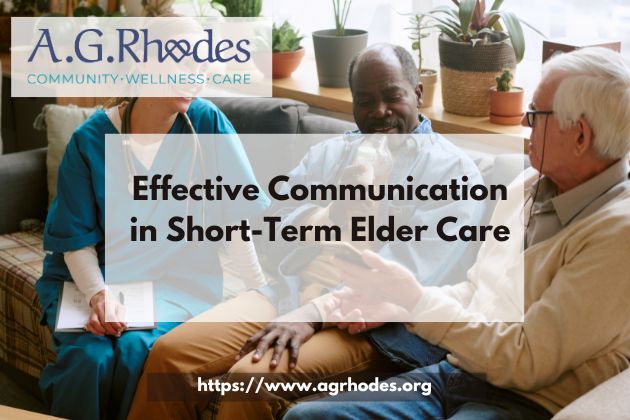 When seniors enter short-term care—whether for post-surgical recovery, rehabilitation, or transitional health needs—communication becomes a vital part of their healing journey. Good communication builds trust, reduces stress, and improves outcomes for patients, families, and care teams.
When seniors enter short-term care—whether for post-surgical recovery, rehabilitation, or transitional health needs—communication becomes a vital part of their healing journey. Good communication builds trust, reduces stress, and improves outcomes for patients, families, and care teams.
Why Communication Matters in Short-Term Elder Care
Unlike long-term care, short-term stays are fast-paced, with a focus on achieving measurable health milestones. Clear and compassionate communication ensures:
- Better Care Coordination: Doctors, nurses, and therapists stay aligned on treatment plans.
- Informed Decision-Making: Families understand what to expect and can advocate for their loved ones.
- Reduced Anxiety: Seniors feel heard and respected, making them more willing to participate in therapy.
Key Strategies for Effective Communication
1. Start With a Clear Admission Conversation
Upon arrival, seniors and families should receive a plain-language overview of the care plan, therapy goals, and anticipated length of stay. This creates transparency from day one.
2. Use Senior-Friendly Communication Techniques
Avoid medical jargon and speak at a comfortable pace. Encourage seniors to ask questions and repeat key points to ensure understanding.
3. Foster Collaboration Between Care Teams
Regular interdisciplinary meetings between nurses, therapists, and physicians keep everyone informed about progress, medication updates, and therapy outcomes.
4. Engage Families in the Process
Family involvement is crucial, especially for short-term rehabilitation. Provide regular updates and invite family members to observe therapy sessions when possible.
5. Leverage Technology for Real-Time Updates
Digital care portals, video calls, and secure messaging allow families to stay connected and reduce unnecessary visits or calls.
Handling Communication Barriers
Some seniors may experience hearing loss, cognitive decline, or language barriers. Solutions include:
- Written instructions and visual aids
- Translation services or bilingual staff
- Speech therapy support for patients with communication challenges
- Calm, quiet environments to minimize distractions
The Role of Empathy and Active Listening
Empathy is just as important as information. Active listening, validating emotions, and responding with compassion can reduce frustration and create a positive care experience for everyone involved.
Conclusion: Communication Is Care
In short-term elder care, effective communication is more than just exchanging information — it’s about building trust, empowering seniors, and ensuring they leave stronger and more confident.
If you’re considering short-term senior care, ask about the facility’s communication practices. Choosing a provider that values transparency and collaboration can make a significant difference in recovery outcomes.
Ready to find short-term care that truly listens and keeps you informed? At A.G. Rhodes, we prioritize open communication, family involvement, and personalized care plans that make recovery smoother and less stressful.
➡ Contact us today to schedule a tour or speak with our admissions team about our short-term rehabilitation programs designed with seniors and families in mind.

